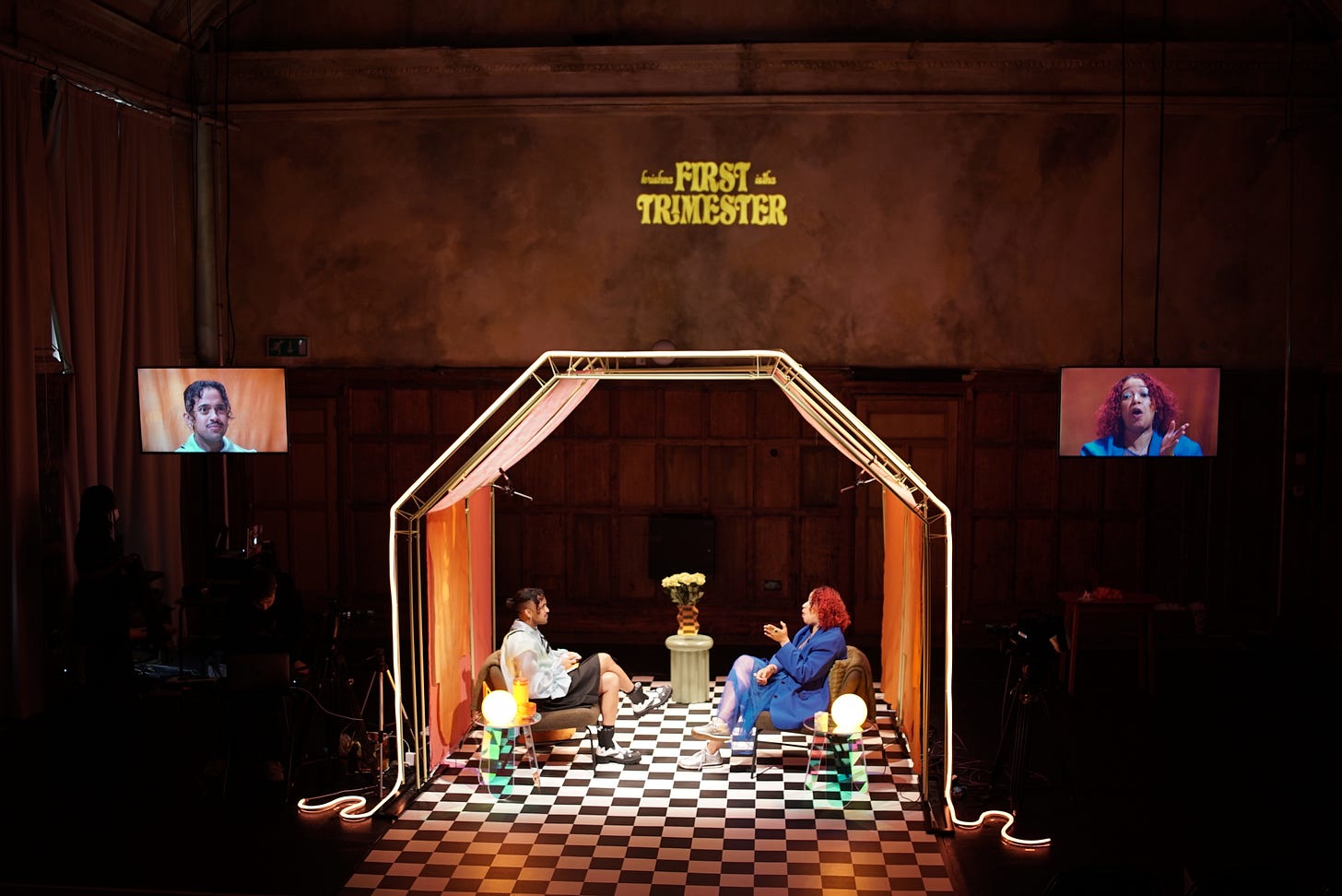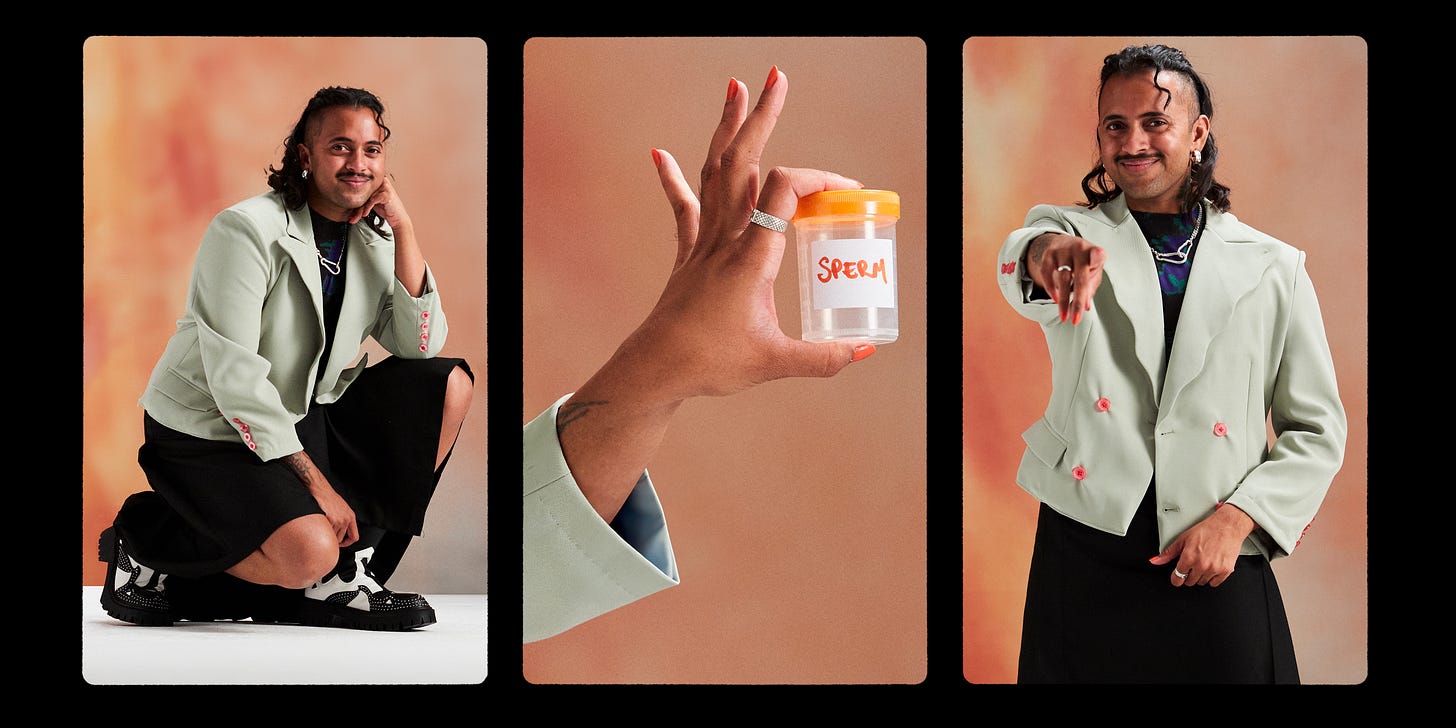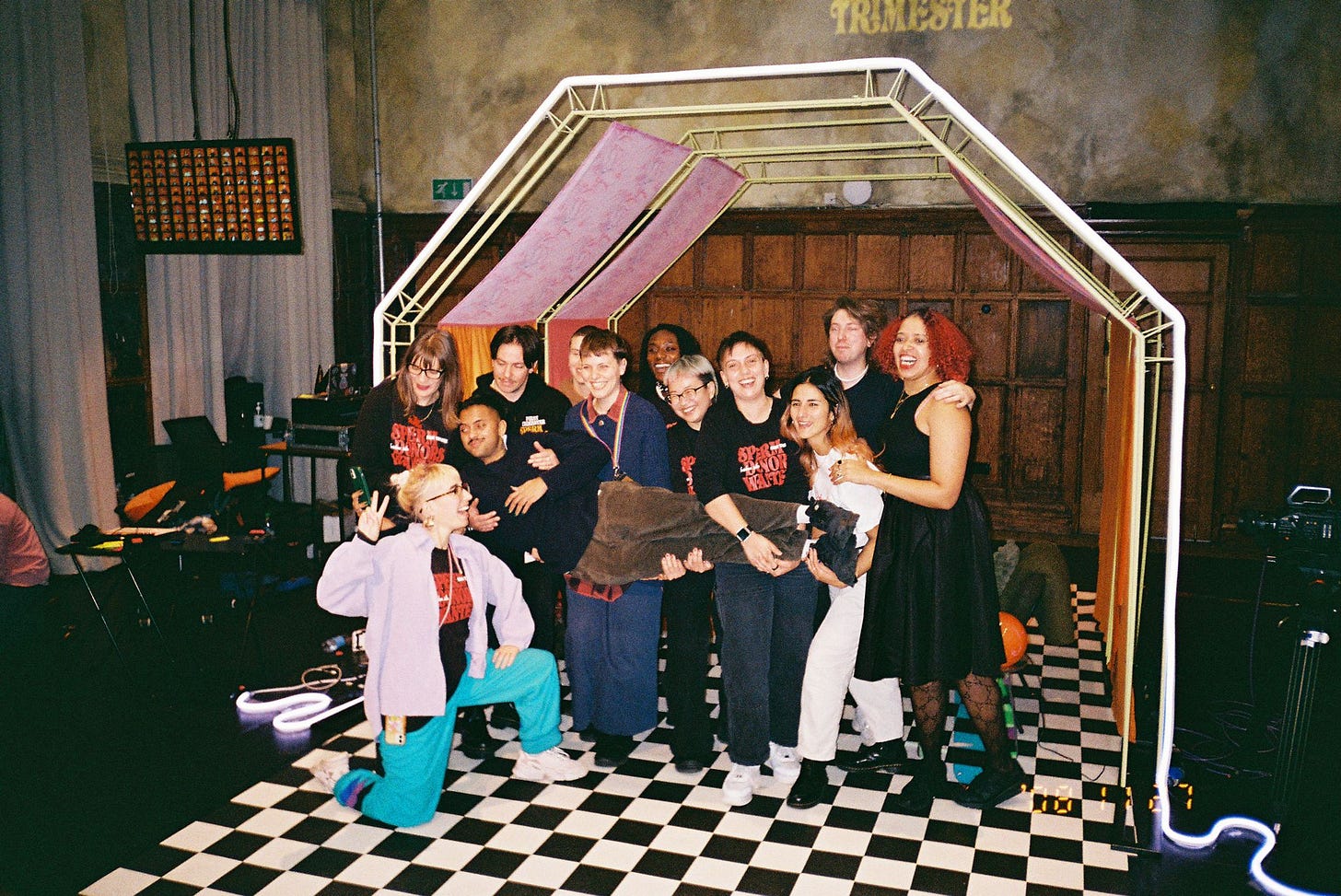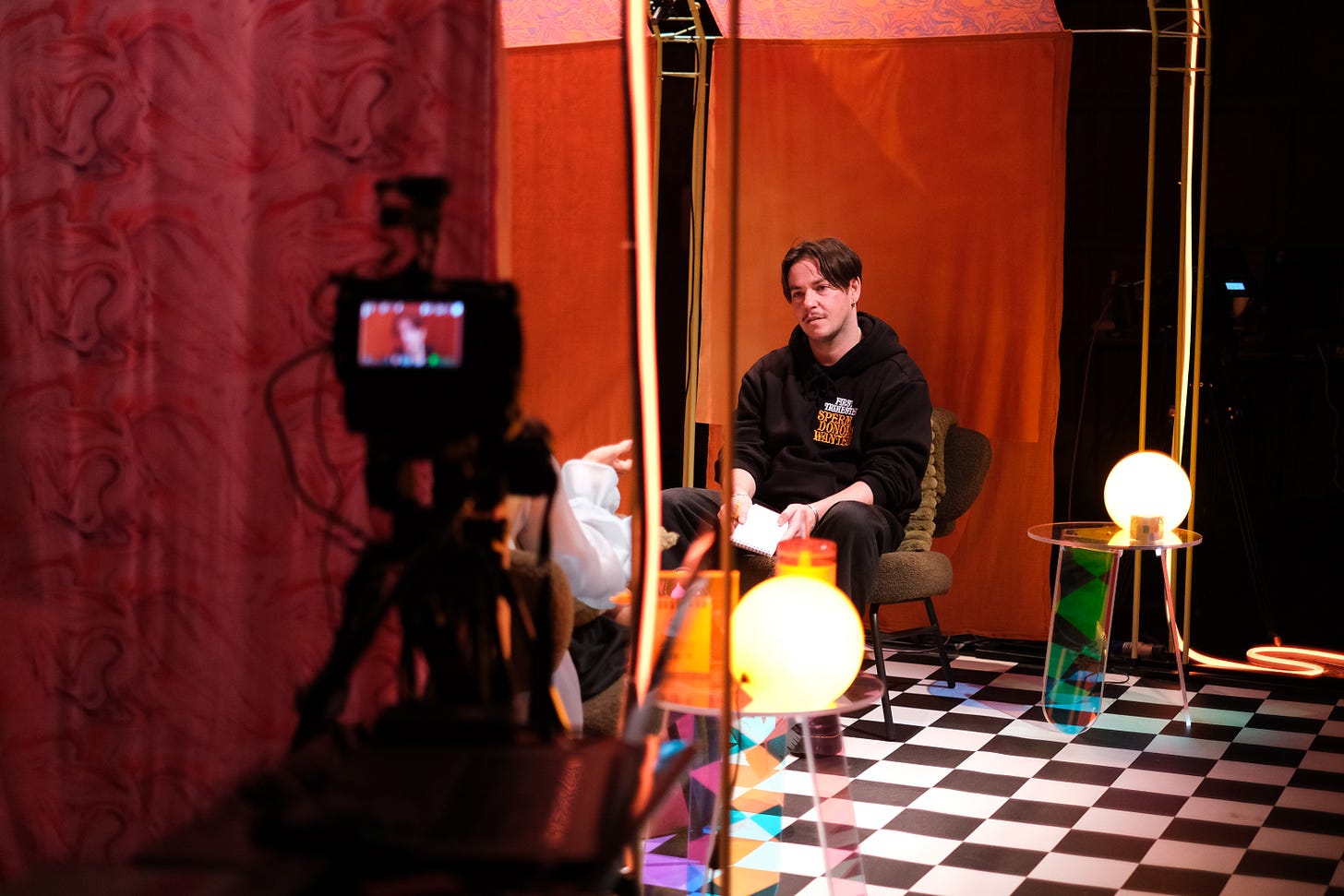The grim consequences of the Supreme Court ruling and the EHRC guidance on trans women have already begun to snowball. High-profile examples this week include Barclays stopping trans women from using women’s toilets and the FA banning trans women from playing women’s football. We can’t let this segregation slip quietly by. Donate to Good Law’s attempt to challenge the judgement.
The show emerged from practicality. “Initially it was a way of solving a problem,” explains Krishna Istha. Krishna and their partner, Logan Rea, want to have a baby. But as a trans couple, the easy options are off the table.
Taking action into their own hands, they created First Trimester, a warm, funny, radically honest show in which Krishna invites strangers to chat to them on stage. At the end of their conversation, the stranger is given the option to offer up their sperm.
I have a crisp memory of a being on stage with Krishna, a sticky heap of duct tape, and dozens of bananas consumed at rapid speed. We were on the National Theatre Young Studio course and had been thrown into the world of durational performance art. Boundaries were pushed and patience prodded as we attempted to understand and unpick how stories should be told. (It turns out the safe word for First Trimester participants is ‘BANANA’.)
In the decade since, Krishna has worked across theatre and comedy, writing on hit TV show Sex Education, performing at Alexandra Palace, and recently creating First Trimester, their revelatory durational show live-documenting their journey towards parenthood. It is the first of a trilogy called the M/OTHERHOOD PROJECT. Show two, Second Trimester, is currently in development with Krishna’s mum.
“We were looking at lots of sperm donor websites,” Krishna says, “and I thought, I can't connect with any of these people.” They found that donor websites offered sparse, sometimes immaterial details: a person’s height; what their handwriting looks like; whether or not they have a PhD. “Sometimes you get letters they’ve written, but all the letters say ‘I'm good at sports and I'm nice’,” Krishna huffs. “I don't care if you're good at sports.”
Fed up with the faceless system, Krishna made an offhand comment to their partner: wouldn’t it be great to actually get to speak to these people? Get to know them. “Then I realised I have the capacity to get hundreds of people in front of me and speak to them if I turn it into a show.” Through First Trimester, they have created a process that interrogates the idea of it taking a village to raise a child. “I was creating resources for myself,” Krishna says, “and that felt good.”
Queerness is deeply embedded in the conversations the show makes room for. It’s in Krishna’s approach to community, in the questioning what makes a family, the curiosity of what a relationship with a sperm donor might look like, and the grappling with the inevitable lack of control in this situation. “It's a feeling, an indefinable feeling,” Krishna says of what queer performance means to them. “That something isn’t linear, that something is broken, maybe? Or maybe it’s about giving you something new.”
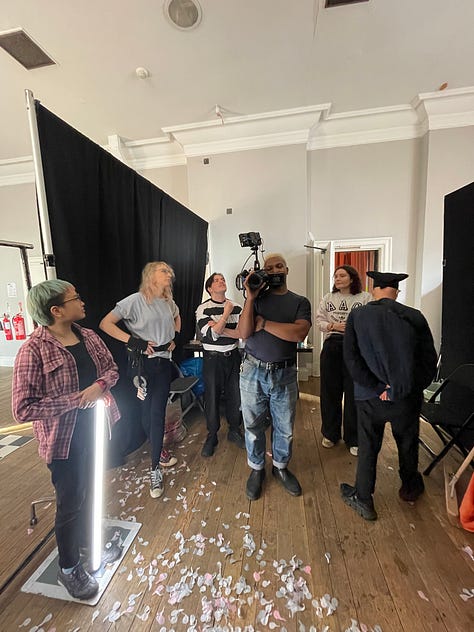
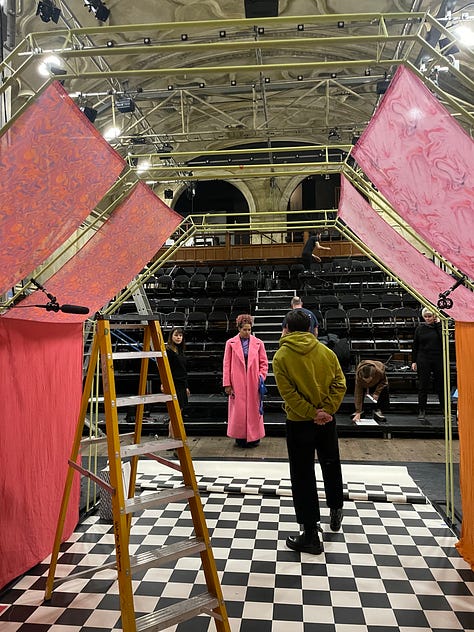

In First Trimester, the participants are asked questions that range from the deep to the trivial: Are you kind? Have you watched The Princess Diaries? Do you talk about race with your family? So far, 242 people have been interviewed across 72 hours of shows, and Krishna has found their answers constantly surprising. “I thought I didn’t decide what a person was like before they sat across from me,” they admit, “but actually, it felt like me and the audience assumed something of each person, and every single one broke that assumption.”
The participants ask Krishna questions too: What are you looking for? Have you pictured yourself with the belly? Do you think you’ve found the right person yet? The experience has been revealing and vulnerable, but never bruisingly so. Measures have been put in place to help everyone feel safe; participants have a 10 minute Zoom check-in with the producer when they sign up, and a 15 minute check-out session with therapist Sabah Choudrey, co-founder of Trans Pride Brighton, right after their interview on stage. Group follow-up sessions are also offered if participants wants to chat through their experience together.
Boundaries also help protect Krishna and Logan. “Just because it's autobiographical doesn't mean people are owed everything,” they say. “You know when it feels wrong.” They don’t, for instance, want to tell the whole world who, if anyone, their final choice will be.
The show has travelled to London, Copenhagen, Auckland and Dublin, with Bern and Melbourne coming up later this year. When it was staged at Battersea Arts Centre, the majority of the audience, who are invited to come and go as they liked, stayed for the full three hours, not wanting to miss what answer might come next. “It was sort of made to be binge-able, like you're watching a Netflix series.”
Alongside First Trimester, they have made a striking Netflix documentary, Sperm Donors Wanted!, with Logan, as part of the Netflix Documentary Talent Fund. Following the process of making the show, it reveals some of the knotty conversations the couple continue to grapple with: how involved should a donor be once the baby is born? how does the use of a donor shift the role of the non-birthing parent? how do you best protect yourselves and your baby? The documentary circles around the question of what qualities you would choose in a donor, and what knowledge the sperm banks fail to provide. “I would rather them be a nice person,” Krishna says in the documentary, “than, I dunno, a transphobe that we have to deal with in 18 years.”
Netflix has been a running thread in their recent work, as they joined the writer’s room for the fourth season of Sex Education, then appeared on Netflix’s Gender Agenda with Hannah Gadsby. This shift to comedy came as a result of a show at the fringe where the artists lay, butt naked, on trestle tables. Wild Bore, made with Zoe Coombs Marr, Ursula Martinez and Adrienne Truscott, critiqued its critics. “There was a quote from one of their reviews about speaking out of their arses,” Krishna laughs, “so the first 20 minutes was the three of them literally speaking out of their arses.” Then Krishna came along and critiqued all of them.
The cast were all sharing a flat at the Edinburgh fringe with Hannah Gadsby, and Hannah and Zoe both pointed out that what Krishna was doing in live art was essentially comedy, just not in comedy spaces. “I didn’t quite know what ‘stand-up’ was really until I saw Zoe and Hannah’s comedy shows that year,” Krishna says, “and watching queer people do ‘comedy’ was revelatory in my own understanding of my practice.” It felt like an extension of live art, telling stories from personal experiences and sly observation. But they prefer the world of theatre. “Too many annoying white men in comedy,” they say drily.
In the decade they’ve been making work, the ground has shifted, with opportunities for emerging artists slipping away. “When I was first applying for things and trying to make work, people were more open to new artists,” they say. “There were more little pots you could apply for. I don’t see those so much anymore. It feels like people are more risk averse.”
There are still some producers and buildings are willing to take the leap. Krishna describes independent producer Ruby Glaskin, who also runs a queer platonic co-parenting group in Brighton, as “the best producer ever for me and this project.” First Trimester was commissioned by Battersea Arts Centre, Roundhouse and Marlborough Productions, and funded by Arts Council England, with extra funding support from Here & Now.
Second Trimester is now in development with Krishna’s mum, and is due to be staged in spring 2026. “This show came from my mum freaking out when I told her I was trying to get pregnant,” Krishna explains, “because she had all these life experiences I didn’t know about. The medical system had treated her really badly, and she had all of these questions, like, ‘How are they going to treat you?’”
Their mum had never told anyone about her own experiences. When Krishna asked why, she said there had been no one there to listen. “I sat with that for so long,” they say quietly. “I can't go back and change anything for her, but theatre is therapy for me, so I thought, maybe I can give her a show where she can tell her story.”
The show also provides a unique platform for a parent to speak directly to other parents. “The main thing my mum wants to get across is a good example of what a parent who is ally of their trans child looks like,” Krishna says, “especially in this climate. As much as she’s doing this to tell her story, she also wants to speak directly to other parents of queer people who might be on the fence, by using her own experience of going from denial to acceptance.”
So far, their mum has been finding it cathartic. And for Krishna? “It’s been fun,” they pause, “and weird and infuriating. You have someone who has no idea how to make live art, so she goes, “But why?” And you’re like, “You’re right. Why do we do it this way? It makes no sense, we're just used to it!”
First Trimester will play in Bern, Switzerland 10-11 May, and Melbourne later this year.
If you’re thinking about kids, queer parenthood or community - or you simply have good taste - watch Sperm Donors Wanted! on Netflix.




